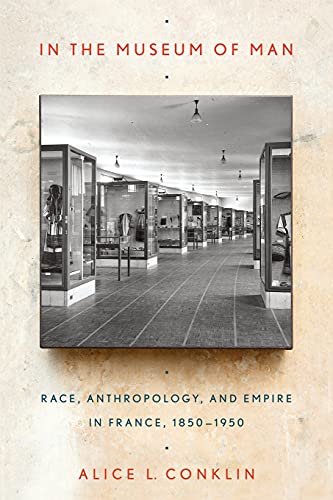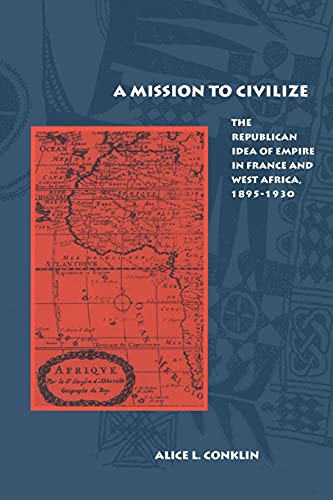Books by Alice Conklin
France and Its Empire Since 1870
Author(s): Alice L. Conklin, Sarah Fishman, Robert Zaretsky
Publication date: 2014-07-15
ISBN: 0199384444, ISBN-13: 9780199384440
Authors Alice L. Conklin, Sarah Fishman, and Robert Zaretsky begin with the premise that while France and the U.S. are sister republics, they also exhibit profound differences that are as compelling as their apparent similarities. The authors frame the book around the contested emergence of the French Republic--a form of government that finally appears to have a permanent status in France--but whose birth pangs were much more protracted than those of the American Republic. Presenting a lively and coherent narrative of the major developments in France's tumultuous history since 1870, the authors organize the chapters around the country's many turning points and confrontations. They also offer detailed analyses of politics, society, and culture, considering the diverse viewpoints of men and women from every background including the working class and the bourgeoisie, immigrants, Catholics, Jews and Muslims, Bretons and Algerians, rebellious youth, and gays and lesbians.
In the Museum of Man: Race, Anthropology, and Empire in France, 1850-1950
Author(s): Alice L. Conklin
Publication date: 2013-10-15
ISBN: 0801478782, ISBN-13: 9780801478789
In the Museum of Man offers new insight into the thorny relationship between science, society, and empire at the high-water mark of French imperialism and European racism. Alice L. Conklin takes us into the formative years of French anthropology and social theory between 1850 and 1900; then deep into the practice of anthropology, under the name of ethnology, both in Paris and in the empire before and especially after World War I; and finally, into the fate of the discipline and its practitioners under the German Occupation and its immediate aftermath.
Conklin addresses the influence exerted by academic networks, museum collections, and imperial connections in defining human diversity socioculturally rather than biologically, especially in the wake of resurgent anti-Semitism at the time of the Dreyfus Affair and in the 1930s and 1940s. Students of the progressive social scientist Marcel Mauss were exposed to the ravages of imperialism in the French colonies where they did fieldwork; as a result, they began to challenge both colonialism and the scientific racism that provided its intellectual justification. Indeed, a number of them were killed in the Resistance, fighting for the humanist values they had learned from their teachers and in the field. A riveting story of a close-knit community of scholars who came to see all societies as equally complex, In the Museum of Man serves as a reminder that if scientific expertise once authorized racism, anthropologists also learned to rethink their paradigms and mobilize against racial prejudice―a lesson well worth remembering today.
European Imperialism: 1830 to 1930 (Problems in European Civilization Series)
Author(s): Alice L. Conklin, Ian Christopher Fletcher
Publication date: 1998-12-18
ISBN: 0395903858, ISBN-13: 9780395903858
A Mission to Civilize: The Republican Idea of Empire in France and West Africa, 1895-1930
Author(s): Alice Conklin
Publication date: 0000-00-00
ISBN: 0804740127, ISBN-13: 9780804740128
French ideas of civilizationsimultaneously republican, racist, and modernencouraged the governors general in the 1890’s to attack such feudal” African institutions as aristocratic rule and slavery in ways that referred back to France’s own experience of revolutionary change. Ironically, local administrators in the 1920’s also invoked these same ideas to justify such reactionary policies as the reintroduction of forced labor, arguing that coercion, which inculcated a work ethic in the lazy” African, legitimized his loss of freedom. By constantly invoking the ideas of civilization,” colonial policy makers in Dakar and Paris managed to obscure the fundamental contradictions between the rights of man” guaranteed in a republican democracy and the forcible acquisition of an empire that violates those rights.
In probing the republican” dimension of French colonization in West Africa, this book also sheds new light on the evolution of the Third Republic between 1895 and 1930. One of the author’s principal arguments is that the idea of a civilized mission underwent dramatic changes, due to ideological, political, and economic transformations occurring simultaneously in France and its colonies. For example, revolts in West Africa as well as a more conservative climate in the metropole after World War I produced in the governors general a new respect for feudal” chiefs, whom the French once despised but now reinstated as a means of control. This discovery of an African tradition” in turn reinforced a reassertion of traditional values in France as the Third Republic struggled to recapture the world it had lost” at Verdun.
Link to this page using the following URL: https://www.facultybookshelf.org/author/alice_conklin



